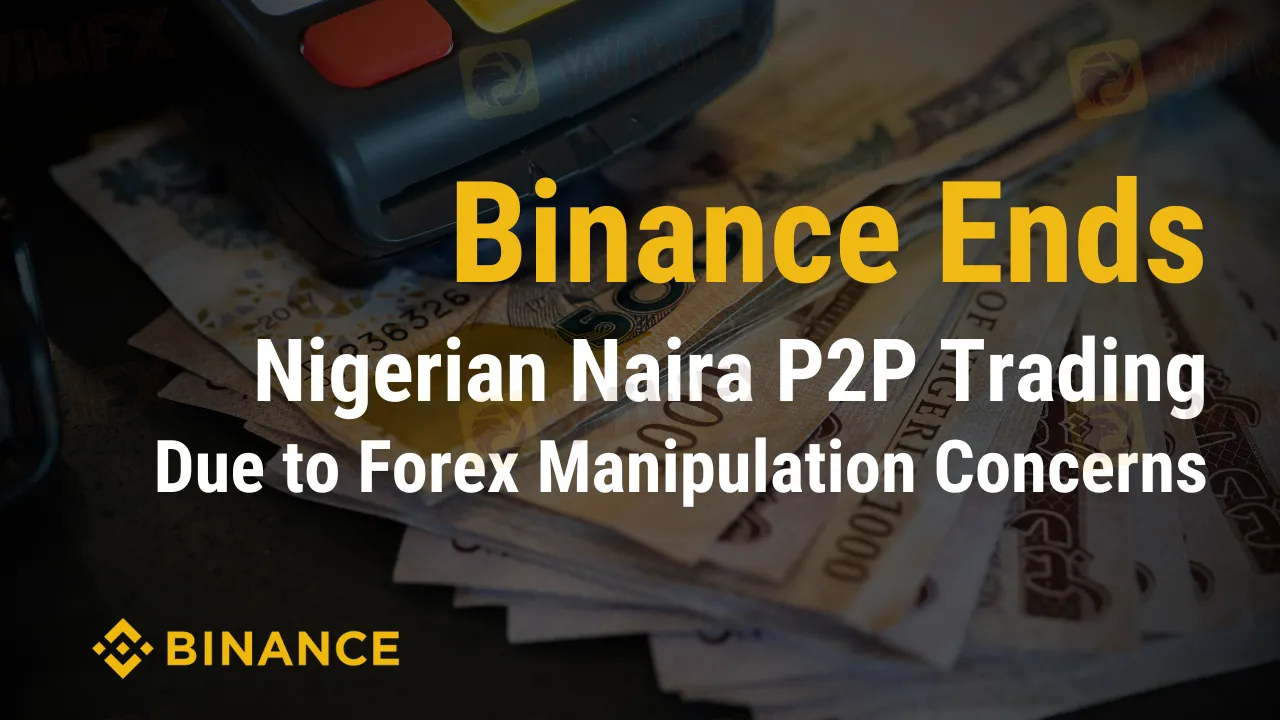简体中文
繁體中文
English
Pусский
日本語
ภาษาไทย
Tiếng Việt
Bahasa Indonesia
Español
हिन्दी
Filippiiniläinen
Français
Deutsch
Português
Türkçe
한국어
العربية
Binance Ends Nigerian Naira P2P Trading Due to Forex Manipulation Concerns
Abstract:Binance withdraws NGN from P2P trading due to Nigeria's stringent crypto regulations and forex manipulation concerns, impacting the country's leading position in global P2P crypto volume.

Binance, a prominent cryptocurrency exchange, stated it would withdraw NGN. Growing concerns over Binance's foreign exchange effect in Nigeria triggered this decision.
NGN was removed from Binance's P2P platform, according to sources close to CryptoSlate. The Nigerian government has been adopting strong measures to regulate the operations of cryptocurrency companies operating in the nation, and it seems that this step is a direct reaction to those increased measures. Notably, the authorities recently imposed access restrictions on the websites of other cryptocurrency companies, including Binance. The authorities' intention to prohibit foreign currency market manipulation and illegal money transfers supports these limitations.
P2P platforms play a crucial role in the cryptocurrency sector by providing a forum for people to discuss and agree on exchange rates for their assets. These prices are often higher than the official interbank rates and are usually dependent on the state of the market, particularly when dealing with volatile fiat currencies. This case is unique because it is the first in which a government has accused cryptocurrency exchanges of manipulating the open market value of their currency.
To make matters worse, two Binance executives were purportedly arrested and had their passports seized when they visited Nigeria. The purpose of their visit was to discuss the Nigerian government's prohibition on cryptocurrency trading websites.

Despite these governmental obstacles, Nigeria remains the global leader in P2P cryptocurrency volume, which indicates that Bitcoin is widely accepted in the country. Amid considerable acclaim and significance within the cryptocurrency industry, the withdrawal of the Naira from Binance's peer-to-peer network has engendered apprehension among Nigerian market participants and merchants.
Regarding these events, Binance has not yet made a public remark. It's important to remember, however, that in 2023, the Nigerian Securities and Exchange Commission declared Binance's activities unlawful because they had failed to comply with the country's licensing regulations.
The governor of Nigeria's Central Bank, Olayemi Cardoso, has accused Binance Nigeria of aiding an untraceable $26 billion transaction in the last year, which has further complicated issues. Cardoso went on to say, “In the last year, 26 billion dollars have passed through Binance Nigeria from sources and users who we cannot adequately identify.” This accusation has heightened the current assault on cryptocurrency platforms and brought attention to the coordinated efforts of government authorities to prevent manipulations of foreign exchange rates.
In Nigeria, cryptocurrencies continue to be very popular despite criticism from the government, particularly among the younger and more tech-savvy citizens of the nation. With no other trustworthy avenues, this group sees cryptocurrency as a necessary substitute for cross-border commerce. Prominent Nigerian internet entrepreneur Victor Asemota emphasized how resilient cryptocurrencies are to regulatory obstacles. Restrictive governmental regulations, he said, may drive cryptocurrency use underground and make it “more hidden and more sinister.” Asemota suggests that the government should enhance the effectiveness of legal channels since simpler options would inevitably lead to a decrease in the use of cryptocurrencies.
An important turning point in the continuing discussion over cryptocurrency regulation and acceptance in Nigeria is the withdrawal of the Nigerian naira from Binance's peer-to-peer network. The Nigerian public's high preference for cryptocurrencies poses a difficult task for the government as it works to control the market and stop manipulation. As a result, the future of cryptocurrencies in Nigeria is still up in the air, awaiting a resolution between government regulation and the obvious and increasing public demand.
Access the WikiFX daily news page to know what's happening in the crypto market.

Disclaimer:
The views in this article only represent the author's personal views, and do not constitute investment advice on this platform. This platform does not guarantee the accuracy, completeness and timeliness of the information in the article, and will not be liable for any loss caused by the use of or reliance on the information in the article.
Read more

Russia to Fully Ban Crypto Mining in 10 Regions Starting January 1, 2025
Starting from January 1, 2025, Russia will implement a comprehensive ban on cryptocurrency mining in 10 regions for a period of six years. The ban will remain in effect until March 15, 2031.

Malaysia’s Crypto Landscape: Adapting Amidst Global Ambitions
The United States is intensifying its efforts to become a global cryptocurrency hub under President-elect Donald Trump. Experts believe this move could prompt countries, including Malaysia, to reassess their regulatory approaches toward digital assets.

SEC Approves Hashdex and Franklin Crypto ETFs on Nasdaq
The SEC has approved crypto index ETFs by Hashdex and Franklin Templeton, including Bitcoin and Ethereum, marking a milestone in crypto asset investment.

North Korean Hackers Steal $1.3bn in Cryptocurrency in 2024
Over $2.2bn in cryptocurrency stolen in 2024, with North Korean hackers accounting for $1.3bn. Discover how cyber theft impacts the evolving crypto landscape.
WikiFX Broker
Latest News
ASIC Sues Binance Australia Derivatives for Misclassifying Retail Clients
AIMS Broker Review
The Hidden Checklist: Five Unconventional Steps to Vet Your Broker
WikiFX Review: Is FxPro Reliable?
Malaysian-Thai Fraud Syndicate Dismantled, Millions in Losses Reported
Trading frauds topped the list of scams in India- Report Reveals
YAMARKETS' Jingle Bells Christmas Offer!
Doo Financial Expands Regulatory Reach with Offshore Licenses in BVI and Cayman Islands
Why is there so much exposure against PrimeX Capital?
Russia to Fully Ban Crypto Mining in 10 Regions Starting January 1, 2025
Currency Calculator


